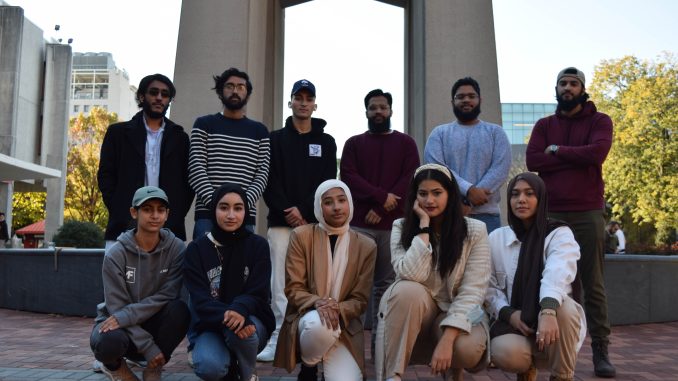
After trying to get a new prayer room for several years, Temple University’s Muslim Students Association announced a campaign on Oct. 26 to move the organization’s prayer space to a bigger location in the Paley Building that will accomodate more students, faculty and staff and connect student and academic life to their prayer sessions.
MSA is gathering data to track attendees by checking people in at the beginning of Friday prayer sessions and organizing meetings with Temple’s administration to discuss MSA’s concerns regarding prayer spaces, said Hamza Asif, a senior neuroscience major and the vice president of MSA.
The organization reached out to President Jason Wingard’s office to see if he would meet with them and are currently communicating about the best day to meet, wrote Kubarah Ghias, a junior neuroscience and psychology major and MSA events coordinator, in an email to The Temple News.
“MSA is looking for more than just a new space and financial support,” wrote Syed Waseem, the Islamic education chair for MSA, in an email to The Temple News. “We are looking for recognition. We are looking for support. We are looking for people to see us as part of the community that makes up Temple University.”
The Division of Student Affairs and Planning and Design work together to “satisfy student space needs” on campus, wrote Stephen Orbanek, a university spokesperson, in an email to The Temple News.
“Many groups have expressed a desire for additional space, and the two departments continue to work to maximize existing spaces and also identify potential new spaces,” Orbanek wrote.
Currently, MSA uses the Underground in Howard Gittis Student Center South for Jummah, which is Friday prayer, and a designated prayer area on the third floor of the Tuttleman Learning Center that often becomes crowded, said Waseem, a senior neuroscience and mathematics and computer science double major.
When the space in Tuttleman becomes crowded for daily praying, Muslim students can use the space under two staircases located on the first floor of Tuttleman, one for women and another for men, said Muna Herzi, a junior biology major and MSA community service chair.
Before prayer, Muslims- wash themselves in a traditional ritual called wudu, but there are no convenient wash stations in any of their prayer locations, Waseem said.
The wash stations are inconvenient because they are dirty and provide no hooks for Muslim sisters to place their scarfs on for wudu, Waseem wrote.
Depending on what is available, MSA members travel to other on-campus locations to accommodate groups ranging from 40 to 100 people convening for prayer every Friday at 1 p.m., Waseem said.
MSA desires a room to accommodate at least 100 people, the expected attendance for weekly Friday prayer, and wants a men’s and women’s washing station near the prayer room to reduce walking distance for wudu, Waseem wrote.
A move to Paley, located at the center of campus, would also provide a more prominent spiritual and religious safe-space for Muslim students on campus, Asif said.
“In essence, having a bigger prayer space in Paley would entail not only spiritual, religious and cultural safety for Muslims, those seeking information about Islam and non-Muslims, but bridge the gap between academic and student life,” Asif wrote in an email to The Temple News.
A prayer room in Paley would show Muslim prospective Temple students and their parents that they would have a prominent space on campus, Asif wrote.
“Muslim parents want their children to have a safe place at college,” Asif wrote.
The University of Pennsylvania offers about 14 different prayer spots, while Drexel University offers prayer spaces for Muslim students in the university’s Intercultural Center and are available at an “at-will” basis.
MSA is a part of the STARS Program, a voluntary program for incentivizing student organization leaders, and has used the student center for more than 15 years, said Jason Levy, senior director of Student Center Operations.
Student Activities has no responsibility for funding student organizations, said Phillip Smith, director of Student Activities.
MSA receives their funding from alumni and events, like their annual bonfire where they charge an entrance fee and more than 200 students from various universities attend, Waseem wrote.
Student Activities has no control over a transition to a new space, but will support MSA through any transition process that may occur and keep its space in Tuttleman, Levy said.
“A permanent prayer space is not just a prayer space,” Waseem wrote. “It symbolizes so much more.”


Be the first to comment